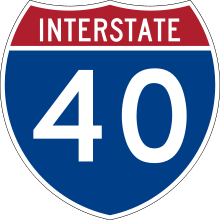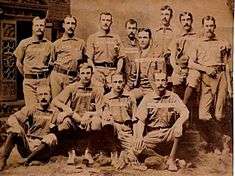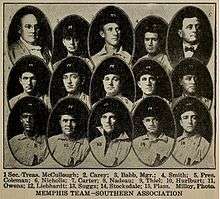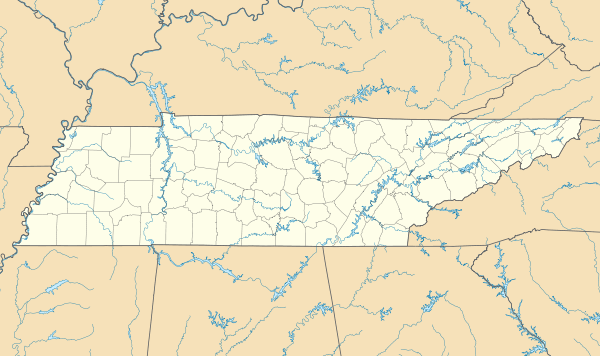I-40 Cup Series
 | |
| Sport | Baseball |
|---|---|
| Teams | |
| First meeting |
May 17, 1998 Tim McCarver Stadium |
| Latest meeting |
August 24, 2016 AutoZone Park |
| Next meeting |
June 9, 2017 AutoZone Park |
| Statistics | |
| Meetings total | 302 |
| Most player appearances |
|
| Regular season series | 162–140, Sounds |
| Largest victory |
16–3, Redbirds (June 15, 2016)*[1] |
| Longest win streak |
|
| Current win streak | Sounds: 3 |
|
* Statistics for 2002–present | |


The I-40 Cup Series is a minor league baseball rivalry between Tennessee's two Triple-A baseball franchises, the Memphis Redbirds and the Nashville Sounds. Competition between minor league teams from Memphis and Nashville began in 1885 in the original Southern League. The cities' teams later competed in the Southern Association and Southern League. The Redbirds and Sounds have competed against one another in the Pacific Coast League (PCL) since 1998. Current PCL playoff procedures exclude the possibility of the Redbirds and Sounds meeting in the postseason, but the Sounds and Vols have faced postseason competition against the Chicks and Chickasaws in previous leagues.
From 2012 to 2015, whichever of the two teams won the most games played between them was declared the winner of the I-40 Cup Series and received a trophy cup to keep until the next season. The losing team donated game tickets to a charity selected by the winner. In the event of a season-series tie, the previous season's winner remained champion.[2] After 2015, the teams discontinued the trophy cup, friendly wager, and promotional references to the Series.
History
Separated by an approximately 200-mile (320 km) stretch of Interstate 40, Memphis and Nashville have fielded several teams which have competed in the same leagues since the late 19th century. The first meeting between Nashville and Memphis teams occurred in 1885 when the Memphis Reds, the city's second professional team, played in the original Southern League against the Nashville Americans, the city's first professional team.[3] In 1886, the Americans competed against the Memphis Grays.[4] The Memphis Browns played against the Nashville Blues in 1887.[5] The Nashville Tigers competed with the Memphis Fever Germs in 1893 and the Memphis Giants in 1894.[6][7] In 1895, the Giants/Lambs played with the Nashville Seraphs.[8] From 1901 to 1960, the Nashville Vols, originally known as the Nashville Baseball Club from 1901 to 1907,[9] faced competition in the Memphis Egyptians (1901–08),[10] Memphis Turtles (1909–11),[11] and Memphis Chickasaws (1912–60).[12]
On September 8, 1906, George Suggs of the visiting Memphis Egyptians pitched an 11-inning no-hitter against the Nashville Baseball Club at Athletic Park. Suggs struck out six batters in the first game of a doubleheader, a 1–0 win.[13] Memphis' George Granger tossed a perfect game against the Vols at Russwood Park on August 25, 1932, in the second game of a doubleheader. He struck out two Vols batters over the course of the seven-inning contest which the Chickasaws won, 1–0.[13]
The 1939 Volunteers defeated the Chickasaws in the playoff semi-finals, 3–0, before going on to win the Southern Association Championship. In 1944, they defeated the Chickasaws to win the championship, 4–3. The 1948 Vols won the Southern Association pennant by three games over the second-place Chickasaws. Roles were reversed in 1953 when Memphis won the pennant by two games over the Vols. Nashville defeated Memphis in the 1957 championship semi-finals, but was defeated in the finals.[14][15]
During this period, several Negro league teams from the two cities competed in the Negro Southern League. The Memphis Red Sox competed against the Nashville White Sox from 1920 to 1922.[16] In 1926 and from 1930 to 1932 and 1935 to 1936, the Red Sox faced off against the Nashville Elite Giants.[16] The Nashville Cubs competed with the Memphis Blues in 1947 and the Red Sox in 1950.[16]
After 60 continuous years of minor league baseball games being played between Memphis and Nashville, a lapse occurred in the rivalry from 1961 to 1977. Competition resumed when the Nashville Sounds became a part of the Double-A Southern League in 1978.[17] The Sounds played in the West Division against the Memphis Chicks. In 1979, the Chicks won the first half of the season and the Sounds won the second half. In the best-of-three division finals, the Sounds defeated the Chicks in two out of three games before going on to win the Southern League Championship.[18] Memphis and Nashville each won the first and second halves, respectively, of the 1980 season. This time, however, Memphis won the Western Division title, defeating Nashville in three out of four games.[18] The teams met again under the same circumstances in 1981. The Sounds swept the Chicks in three straight games to win the Western Division finals.[18]
The interstate rivalry was interrupted again when Nashville moved to the Triple-A American Association in 1985, but was renewed in 1998 when the Sounds joined the Triple-A Pacific Coast League and the Memphis Redbirds were created as an expansion team.[19] The teams played their first game against one another, a 5–3 Nashville win, on May 17, 1998, at Tim McCarver Stadium in Memphis.[20] The Sounds and Redbirds were division rivals in the American Conference East Division from 1998 to 2004,[19] the American Conference North Division from 2005 to 2013,[21] and the American Conference Southern Division since 2014.[22]
The longest Redbirds winning streak occurred from August 13 to September 1, 2005, when the team won six games in a row against the Sounds.[23] Nashville's longest winning streak lasted for nine games from July 4 to August 24, 2006.[24] On July 15, 2006, Sounds pitchers Carlos Villanueva (6 IP), Mike Meyers (2 IP), and Alec Zumwalt (1 IP) combined to no-hit the Redbirds, 2–0, at Herschel Greer Stadium in Nashville.[25] In 2009, Memphis clinched the American Conference North Division title, finishing the season just two games ahead of Nashville which spent the majority of the season in first place.[26] Similarly, Nashville finished the 2014 season two-and-a-half games behind Memphis after having led the division for most of the season.[22]
Teams timeline
| Nashville vs. Memphis Timeline | |||
|---|---|---|---|
| Year(s) | League | Memphis | Nashville |
| 1885 | Southern League | Reds | Americans |
| 1886 | Grays | ||
| 1887 | Browns | Blues | |
| 1893 | Fever Germs | Tigers | |
| 1894 | Giants/Lambs | ||
| 1895 | Seraphs | ||
| 1901–08 | Southern Association | Egyptians | Vols |
| 1909–11 | Turtles | ||
| 1912–60 | Chickasaws | ||
| 1978–84 | Southern League | Chicks | Sounds |
| 1998–present | Pacific Coast League | Redbirds | |
Results
All-time results
As of the completion of the 2016 series, Memphis leads the all-time series against Nashville with a record of 905–880 (.507).[27] This record encompasses all 92 years of competition in the original Southern League, Southern Association, Southern League, and Pacific Coast League. Nashville, however, leads the 19-year PCL series with a record of 162–140 (.536).[2][28]
| All-Time Pacific Coast League Series | |||
|---|---|---|---|
| Year | Series Winner | Memphis Wins | Nashville Wins |
| 1998 | Sounds | 6 | 10 |
| 1999 | Tie | 8 | 8 |
| 2000 | Tie | 7 | 7 |
| 2001 | Sounds | 6 | 10 |
| 2002 | Sounds | 5 | 11 |
| 2003 | Sounds | 7 | 9 |
| 2004 | Redbirds | 9 | 7 |
| 2005 | Tie | 8 | 8 |
| 2006 | Sounds | 6 | 10 |
| 2007 | Sounds | 5 | 11 |
| 2008 | Redbirds | 10 | 6 |
| 2009 | Sounds | 6 | 10 |
| 2010 | Sounds | 7 | 9 |
| 2011 | Redbirds | 10 | 6 |
| 2012 | Sounds | 7 | 9 |
| 2013 | Redbirds | 9 | 7 |
| 2014 | Tie | 8 | 8 |
| 2015 | Tie | 8 | 8 |
| 2016 | Tie | 8 | 8 |
| Overall | Sounds (9–4–6) | 140 | 162 |
I-40 Cup Series results
The Sounds won the inaugural 2012 I-40 Cup Series. Memphis won all three subsequent series from 2013 to 2015.[2] Across all four seasons of contention, the teams tied with a 32–32 game record.[2]
| I-40 Cup Series | ||||
|---|---|---|---|---|
| Year | Series Winner | Memphis Wins | Nashville Wins | Notes |
| 2012 | Sounds | 7 | 9 | First Nashville win |
| 2013 | Redbirds | 9 | 7 | First Memphis win |
| 2014 | Redbirds | 8 | 8 | Series tied; Memphis retains cup |
| 2015 | Redbirds | 8 | 8 | Series tied; Memphis retains cup |
| Overall | Redbirds (3–1) | 32 | 32 | — |
Players
The player with the most appearances in the series is Memphis second baseman Bo Hart, who played 56 games. Nashville's leader in games played is outfielder Caleb Gindl (55). Catcher Bryan Anderson played 47 games for the Redbirds and 7 games for the Sounds, giving him a combined total of 54 games played, the most among combined team players. The top five leaders for appearances for both teams are as follows:[29]
| Players by Most Appearances[a] | |||
|---|---|---|---|
| Redbirds | Sounds | ||
| Player | Games | Player | Games |
| Bo Hart | 56 | Caleb Gindl | 55 |
| John Gall | 52 | Brendan Katin | 44 |
| Bryan Anderson | 47 | Ozzie Chavez | 39 |
| Nick Stavinoha | 44 | Mat Gamel | 38 |
| Greg Garcia | 42 | Vinny Rottino | 37 |
| a These records include only 2002 to the present. Italics indicate a player currently in that team's organization. | |||
References
- General
- "Tennessee Lottery I-40 Cup Series". Nashville Sounds. Minor League Baseball. Archived from the original on April 16, 2016. Retrieved April 16, 2016.
- Specific
- ↑ "Memphis vs. Nashville - June 15, 2016". MiLB.com. June 15, 2016. Retrieved June 30, 2016.*
- 1 2 3 4 "Tennessee Lottery I-40 Cup Series". Nashville Sounds. Minor League Baseball. Retrieved August 28, 2015.
- ↑ "1885 Southern League Statistics". Baseball-Reference.com. Sports Reference LLC. Retrieved August 28, 2015.
- ↑ "1886 Southern Association Statistics". Baseball-Reference.com. Sports Reference LLC. Retrieved August 28, 2015.
- ↑ "1887 Southern League Statistics". Baseball-Reference.com. Sports Reference LLC. Retrieved August 28, 2015.
- ↑ "1893 Southern Association Statistics". Baseball-Reference.com. Sports Reference LLC. Retrieved August 28, 2015.
- ↑ "1894 Southern Association Statistics". Baseball-Reference.com. Sports Reference LLC. Retrieved August 28, 2015.
- ↑ "1895 Southern Association Statistics". Baseball-Reference.com. Sports Reference LLC. Retrieved August 28, 2015.
- ↑ Nipper, Skip (October 1, 2013). "Name That Team". 262 Down Right. Retrieved January 28, 2015.
- ↑ "1901 Southern Association Statistics". Baseball-Reference.com. Sports Reference LLC. Retrieved August 28, 2015.
- ↑ "1909 Southern Association Statistics". Baseball-Reference.com. Sports Reference LLC. Retrieved August 28, 2015.
- ↑ "1912 Southern Association Statistics". Baseball-Reference.com. Sports Reference LLC. Retrieved August 28, 2015.
- 1 2 McGill, Chuck. "Minor League No-Hitters". Baseball-Reference.com. Sports Reference LLC. Retrieved September 17, 2015.
- ↑ O'Neal, Bill (1994), The Southern League: Baseball in Dixie, 1885–1994, Eakin Press, pp. 306–307, ISBN 0890159521
- ↑ "Timeline" (PDF). Southern Association Baseball. Retrieved September 18, 2015.
- 1 2 3 "Negro Southern League (1920-1951)" (PDF). Center for Negro League Baseball Research. Retrieved January 31, 2015.
- ↑ "1978 Southern League Statistics". Baseball-Reference.com. Sports Reference LLC. Retrieved August 28, 2015.
- 1 2 3 "Postseason History" (PDF). Nashville Sounds 2015 Media Guide. Minor League Baseball. pp. 167–168. Archived from the original (PDF) on April 7, 2015. Retrieved August 28, 2015.
- 1 2 "1998 Pacific Coast League Statistics". Baseball-Reference.com. Sports Reference LLC. Retrieved August 28, 2015.
- ↑ "Pacific Coast League Baseball - Nashville vs. Memphis". USAToday.com. May 17, 1998. Retrieved June 28, 2016.
- ↑ "2005 Pacific Coast League Statistics". Baseball-Reference.com. Sports Reference LLC. Retrieved August 28, 2015.
- 1 2 "2014 Pacific Coast League Statistics". Baseball-Reference.com. Sports Reference LLC. Retrieved August 28, 2015.
- ↑ "Nashville Sounds Game-by-Game Results: 2005". Minor League Baseball. Retrieved June 16, 2016.
- ↑ "Nashville Sounds Game-by-Game Results: 2006". Minor League Baseball. Retrieved June 16, 2016.
- ↑ Rega, Marissa (July 15, 2006). "Nashville Trio Combines on No-hitter". Minor League Baseball. Retrieved June 23, 2014.
- ↑ "2009 Pacific Coast League Statistics". Baseball-Reference.com. Sports Reference LLC. Retrieved August 28, 2015.
- ↑ "Memphis All-Time Record Vs. Cities" (PDF). 2015 Memphis Redbirds Media Guide. Minor League Baseball. 2015. p. 163. Archived from the original (PDF) on April 1, 2015. Retrieved August 28, 2015.
- ↑ "Memphis Redbirds" (PDF). Nashville Sounds 2015 Media Guide. Minor League Baseball. p. 133. Archived from the original (PDF) on April 7, 2015. Retrieved August 28, 2015.
- ↑ "Nashville Sounds Game-by-Game Results". Minor League Baseball. Retrieved May 10, 2016.


